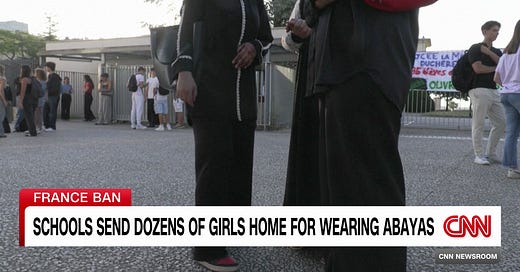From Hijab to Abaya Bans: Policing Muslim Girls' Bodies in France
This onslaught on Muslim girls and women, across France, has not summoned the rage of western feminists or the protests of leading women’s organizations.
It was back-to-school for students across France this past Monday. The day also marked the enforcement of a new law at French public schools, prohibiting Muslim girls from wearing the abaya – a flowing dress that aligns with the Islamic touchstone of modesty.
At over 500 schools across France, the federal government deputized monitors to inspect the dress of Muslim girls and teenagers reporting for school. Their presence was heaviest in Muslim-concentrated areas outside of Paris, Marseilles, and other cities and towns, keen on imposing the newest tentacle of French Islamophobia and turn away students who clenched onto their assailed faith.
298 Muslim girls reported to school dressed in abayas, the majority of them over the age of 15. However, the girls were sent home with the cruel assignment of choosing between their religious observance and their right to an education. The “Abaya Ban,” as it is now widely known, was now reality.
This ultimatum – pitting freedom of religion against societal inclusion – sits at the very core of the architecture of French Islamophobia. As illustrated by the new abaya ban, and the “Hijab Ban” enacted nearly two decades before it, this architecture of French Islamophobia is acutely gendered, and imposed squarely on the heads and bodies of Muslim girls and women in across the Republic.
The French secular mandate of eroding Islam within public spaces has fixated on Muslim women and girls as its primary targets. The Muslim population in France, the largest in western Europe which comprises 10% of the citizenry, inspires fears of “replacement” in the imagination of French citizens. A fear that has historically been exploited then peddled politically by Marine Le Pen and her right-winged National Rally Party.
These pervasive fears of replacement have spilled into the mainstream in France, exhibited by the newly-minted abaya ban. This was a law enacted by President Emanuel Macron, a political centrist, whose posture toward Islam has spiraled in an effort to compete for the hearts and minds of a French people seduced by the Islamophobic rhetoric of the right and the illiberal policies levied upon the heads of Muslim girls.
Muslim girls are interlocked directly in between. Compelled to undress themselves of the garments that express their piety and conform their bodies to the Islamophobic measuring stick of the state.
This onslaught on Muslim girls and women, across France, has not summoned the rage of western feminists or the protests of leading women’s organizations.
Perhaps their support is conditional: only coming when Muslim women are removing their hijabs in line with the secular side of liberty, while standing silent when Muslim girls and women are fighting for denied religious liberty on the other side of the coin.
Meanwhile, the policing of Muslim women’s bodies continues in France. Expanded menacingly with manned checkpoints at schools where the bodies, heads, and hearts are systematically inspected as if they are criminals.






The French are trying to hold onto their culture. Maybe they are going about it in the wrong way, but we have to have empathy for a people that are trying to hold onto their values, culture, way of life. There are plenty of modest clothing items availabel to wear like long skirts and long sleeved shirts. Abayas are really unneccessary. Hijab - my understanding is that it is only forbidden in schools and other State run working places but one can wear one when working in a privately owned business or going about their own way in public - am I wrong? And this is because other symbols of religion are similarly banned in such places, such as wearing crosses or yamulkas, etc. Am I right or wrong on this? Of course niqab (face covering) should be banned everywhere for obvious reasons, that is a no brainer. Other than this. masjids and other places of worship are prevelant in France where people can freely gather and practice their right to religion.
I'm not French so feel free to correct me where I'm wrong. I'm not there so can't speak from personal experience.
Huda Hafez